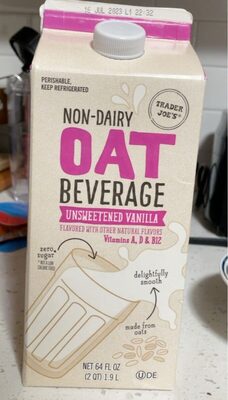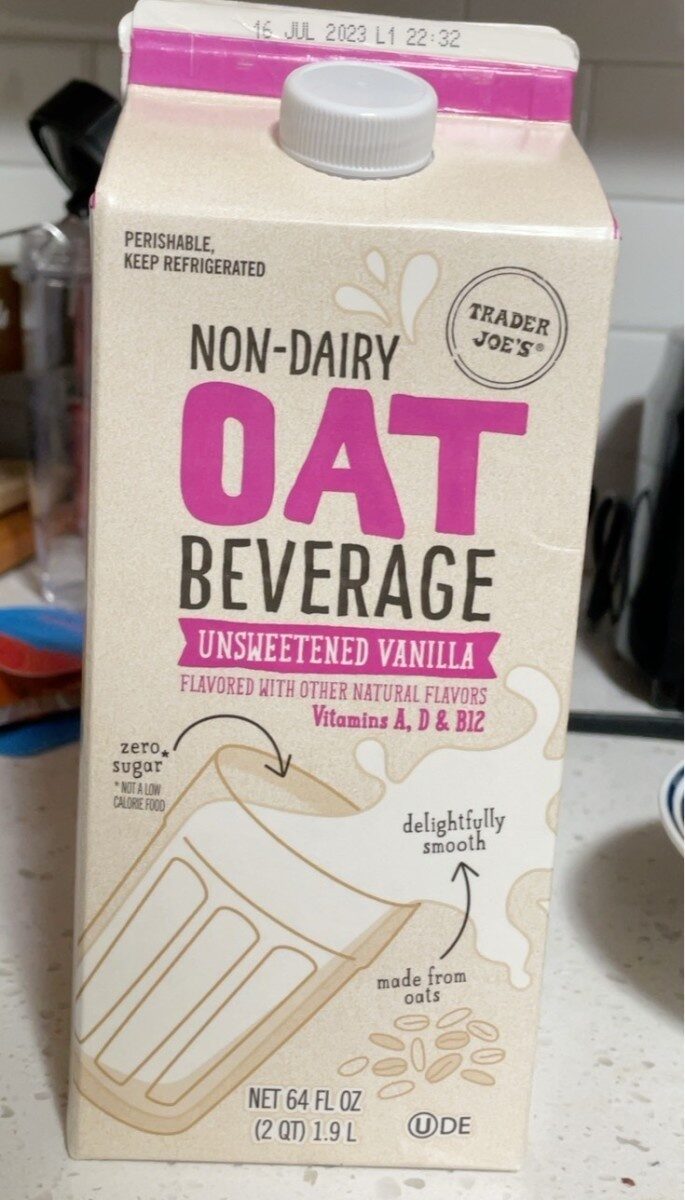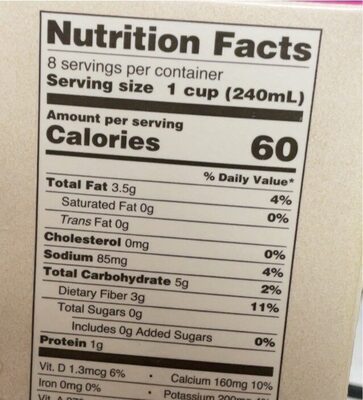Help us make food transparency the norm!
As a non-profit organization, we depend on your donations to continue informing consumers around the world about what they eat.
The food revolution starts with you!
Non-Dairy Oat Beverage Unsweetened Vanilla - Trader Joe's - 64 fl oz
Non-Dairy Oat Beverage Unsweetened Vanilla - Trader Joe's - 64 fl oz
Ambiguous barcode: This product has a Restricted Circulation Number barcode for products within a company. This means that different producers and stores can use the same barcode for different products.
×
This product page is not complete. You can help to complete it by editing it and adding more data from the photos we have, or by taking more photos using the app for Android or iPhone/iPad. Thank you!
×
Barcode: 00750547
Quantity: 64 fl oz
Brands: Trader Joe's
Categories: Plant-based foods and beverages, Beverages, Plant-based foods, Cereals and potatoes, Dairy substitutes, Cereals and their products, Milk substitutes, Plant-based beverages, Plant-based milk alternatives, Cereal-based drinks, Oat-based drinks
Link to the product page on the official site of the producer: https://www.traderjoes.com/home/products...
Stores: Trader Joe's
Countries where sold: United States
Matching with your preferences
Health
Ingredients
-
21 ingredients
PARTIALLY HYDROLYZED OATS, VEGETABLE OIL (SUNFLOWER AND/OR CANOLA AND/OR PALM OIL), NATURAL FLAVORS, CALCIUM CARBONATE, DIPOTASSIUM PHOSPHATE, SUNFLOWER LECITHIN, GELLAN GUM, XANTHAN GUM, SEA SALT, TRICALCIUM PHOSPHATE, CITRIC ACID (ACIDIFIER), VITAMIN FORTIFICATION BLEND (VITAMIN A PALMITATE, VITAMIN D2 [ERGOCALCIFEROL], RIBOFLAVIN [VITAMIN B2], VITAMIN B12 [CYANOCOBALAMIN])
Food processing
-
Ultra processed foods
Elements that indicate the product is in the 4 - Ultra processed food and drink products group:
- Additive: E322 - Lecithins
- Additive: E415 - Xanthan gum
- Additive: E418 - Gellan gum
- Ingredient: Flavouring
Food products are classified into 4 groups according to their degree of processing:
- Unprocessed or minimally processed foods
- Processed culinary ingredients
- Processed foods
- Ultra processed foods
The determination of the group is based on the category of the product and on the ingredients it contains.
Additives
-
E322 - Lecithins
Lecithins are natural compounds commonly used in the food industry as emulsifiers and stabilizers.
Extracted from sources like soybeans and eggs, lecithins consist of phospholipids that enhance the mixing of oil and water, ensuring smooth textures in various products like chocolates, dressings, and baked goods.
They do not present any known health risks.
-
E322i - Lecithin
Lecithins are natural compounds commonly used in the food industry as emulsifiers and stabilizers.
Extracted from sources like soybeans and eggs, lecithins consist of phospholipids that enhance the mixing of oil and water, ensuring smooth textures in various products like chocolates, dressings, and baked goods.
They do not present any known health risks.
-
E330 - Citric acid
Citric acid is a natural organic acid found in citrus fruits such as lemons, oranges, and limes.
It is widely used in the food industry as a flavor enhancer, acidulant, and preservative due to its tart and refreshing taste.
Citric acid is safe for consumption when used in moderation and is considered a generally recognized as safe (GRAS) food additive by regulatory agencies worldwide.
-
E340 - Potassium phosphates
Potassium phosphate: Potassium phosphate is a generic term for the salts of potassium and phosphate ions including: Monopotassium phosphate -KH2PO4- -Molar mass approx: 136 g/mol- Dipotassium phosphate -K2HPO4- -Molar mass approx: 174 g/mol- Tripotassium phosphate -K3PO4- -Molar mass approx: 212.27 g/mol-As food additives, potassium phosphates have the E number E340.Source: Wikipedia
-
E340ii - Dipotassium phosphate
Potassium phosphate: Potassium phosphate is a generic term for the salts of potassium and phosphate ions including: Monopotassium phosphate -KH2PO4- -Molar mass approx: 136 g/mol- Dipotassium phosphate -K2HPO4- -Molar mass approx: 174 g/mol- Tripotassium phosphate -K3PO4- -Molar mass approx: 212.27 g/mol-As food additives, potassium phosphates have the E number E340.Source: Wikipedia
-
E415 - Xanthan gum
Xanthan gum (E415) is a natural polysaccharide derived from fermented sugars, often used in the food industry as a thickening and stabilizing agent.
This versatile food additive enhances texture and prevents ingredient separation in a wide range of products, including salad dressings, sauces, and gluten-free baked goods.
It is considered safe for consumption even at high intake amounts.
-
E418 - Gellan gum
Gellan gum: Gellan gum is a water-soluble anionic polysaccharide produced by the bacterium Sphingomonas elodea -formerly Pseudomonas elodea based on the taxonomic classification at the time of its discovery-. Its taxonomic classification has been subsequently changed to Sphingomonas elodea based on current classification system. The gellan-producing bacterium was discovered and isolated by the former Kelco Division of Merck & Company, Inc. in 1978 from the lily plant tissue from a natural pond in Pennsylvania, USA. It was initially identified as a substitute gelling agent at significantly lower use level to replace agar in solid culture media for the growth of various microorganisms Its initial commercial product with the trademark as "GELRITE" gellan gum, was subsequently identified as a suitable agar substitute as gelling agent in various clinical bacteriological media.Source: Wikipedia
Ingredients analysis
-
Palm oil free
No ingredients containing palm oil detected
Unrecognized ingredients: Partially-hydrolyzed-oats, Sunflower-and-canola-and-palm-oil, Vitamin-fortification-blendSome ingredients could not be recognized.
We need your help!
You can help us recognize more ingredients and better analyze the list of ingredients for this product and others:
- Edit this product page to correct spelling mistakes in the ingredients list, and/or to remove ingredients in other languages and sentences that are not related to the ingredients.
- Add new entries, synonyms or translations to our multilingual lists of ingredients, ingredient processing methods, and labels.
If you would like to help, join the #ingredients channel on our Slack discussion space and/or learn about ingredients analysis on our wiki. Thank you!
-
Vegan status unknown
Unrecognized ingredients: Partially-hydrolyzed-oats, Sunflower-and-canola-and-palm-oil, Vitamin-fortification-blend, Vitamin b12, CyanocobalaminSome ingredients could not be recognized.
We need your help!
You can help us recognize more ingredients and better analyze the list of ingredients for this product and others:
- Edit this product page to correct spelling mistakes in the ingredients list, and/or to remove ingredients in other languages and sentences that are not related to the ingredients.
- Add new entries, synonyms or translations to our multilingual lists of ingredients, ingredient processing methods, and labels.
If you would like to help, join the #ingredients channel on our Slack discussion space and/or learn about ingredients analysis on our wiki. Thank you!
-
Vegetarian status unknown
Unrecognized ingredients: Partially-hydrolyzed-oats, Sunflower-and-canola-and-palm-oil, Vitamin-fortification-blend, Vitamin b12, CyanocobalaminSome ingredients could not be recognized.
We need your help!
You can help us recognize more ingredients and better analyze the list of ingredients for this product and others:
- Edit this product page to correct spelling mistakes in the ingredients list, and/or to remove ingredients in other languages and sentences that are not related to the ingredients.
- Add new entries, synonyms or translations to our multilingual lists of ingredients, ingredient processing methods, and labels.
If you would like to help, join the #ingredients channel on our Slack discussion space and/or learn about ingredients analysis on our wiki. Thank you!
-
Details of the analysis of the ingredients
We need your help!
Some ingredients could not be recognized.
We need your help!
You can help us recognize more ingredients and better analyze the list of ingredients for this product and others:
- Edit this product page to correct spelling mistakes in the ingredients list, and/or to remove ingredients in other languages and sentences that are not related to the ingredients.
- Add new entries, synonyms or translations to our multilingual lists of ingredients, ingredient processing methods, and labels.
If you would like to help, join the #ingredients channel on our Slack discussion space and/or learn about ingredients analysis on our wiki. Thank you!
en: PARTIALLY HYDROLYZED OATS, VEGETABLE OIL (SUNFLOWER and CANOLA and PALM OIL), NATURAL FLAVORS, CALCIUM CARBONATE, DIPOTASSIUM PHOSPHATE, SUNFLOWER LECITHIN, GELLAN GUM, XANTHAN GUM, SEA SALT, TRICALCIUM PHOSPHATE, CITRIC ACID (ACIDIFIER), VITAMIN FORTIFICATION BLEND (VITAMIN A PALMITATE, VITAMIN D2 (ERGOCALCIFEROL), RIBOFLAVIN (VITAMIN B2), VITAMIN B12 (CYANOCOBALAMIN))- PARTIALLY HYDROLYZED OATS -> en:partially-hydrolyzed-oats - percent_min: 19.646 - percent_max: 100
- VEGETABLE OIL -> en:vegetable-oil - vegan: yes - vegetarian: yes - from_palm_oil: maybe - percent_min: 0 - percent_max: 50
- SUNFLOWER and CANOLA and PALM OIL -> en:sunflower-and-canola-and-palm-oil - percent_min: 0 - percent_max: 50
- NATURAL FLAVORS -> en:natural-flavouring - vegan: maybe - vegetarian: maybe - percent_min: 0 - percent_max: 5
- CALCIUM CARBONATE -> en:e170i - vegan: maybe - vegetarian: maybe - percent_min: 0 - percent_max: 5
- DIPOTASSIUM PHOSPHATE -> en:e340ii - vegan: yes - vegetarian: yes - percent_min: 0 - percent_max: 5
- SUNFLOWER LECITHIN -> en:sunflower-lecithin - vegan: yes - vegetarian: yes - percent_min: 0 - percent_max: 5
- GELLAN GUM -> en:e418 - vegan: yes - vegetarian: yes - percent_min: 0 - percent_max: 5
- XANTHAN GUM -> en:e415 - vegan: yes - vegetarian: yes - percent_min: 0 - percent_max: 5
- SEA SALT -> en:sea-salt - vegan: yes - vegetarian: yes - ciqual_food_code: 11082 - percent_min: 0 - percent_max: 0.0885
- TRICALCIUM PHOSPHATE -> en:e341iii - vegan: yes - vegetarian: yes - percent_min: 0 - percent_max: 0.0885
- CITRIC ACID -> en:e330 - vegan: yes - vegetarian: yes - percent_min: 0 - percent_max: 0.0885
- ACIDIFIER -> en:acid - percent_min: 0 - percent_max: 0.0885
- VITAMIN FORTIFICATION BLEND -> en:vitamin-fortification-blend - percent_min: 0 - percent_max: 0.0885
- VITAMIN A PALMITATE -> en:retinyl-palmitate - vegan: yes - vegetarian: yes - percent_min: 0 - percent_max: 0.0885
- VITAMIN D2 -> en:ergocalciferol - vegan: yes - vegetarian: yes - percent_min: 0 - percent_max: 0.0885
- ERGOCALCIFEROL -> en:ergocalciferol - vegan: yes - vegetarian: yes - percent_min: 0 - percent_max: 0.0885
- RIBOFLAVIN -> en:e101 - vegan: maybe - vegetarian: yes - percent_min: 0 - percent_max: 0.0885
- VITAMIN B2 -> en:e101 - vegan: maybe - vegetarian: yes - percent_min: 0 - percent_max: 0.0885
- VITAMIN B12 -> en:vitamin-b12 - percent_min: 0 - percent_max: 0.0885
- CYANOCOBALAMIN -> en:cyanocobalamin - percent_min: 0 - percent_max: 0.0885
Nutrition
-
Very good nutritional quality
⚠ ️Warning: the amount of fruits, vegetables and nuts is not specified on the label, it was estimated from the list of ingredients: 0This product is not considered a beverage for the calculation of the Nutri-Score.
Positive points: 1
- Proteins: 0 / 5 (value: 0.417, rounded value: 0.42)
- Fiber: 1 / 5 (value: 1.25, rounded value: 1.25)
- Fruits, vegetables, nuts, and colza/walnut/olive oils: 0 / 5 (value: 0, rounded value: 0)
Negative points: 0
- Energy: 0 / 10 (value: 105, rounded value: 105)
- Sugars: 0 / 10 (value: 0, rounded value: 0)
- Saturated fat: 0 / 10 (value: 0, rounded value: 0)
- Sodium: 0 / 10 (value: 35.4, rounded value: 35.4)
The points for proteins are counted because the negative points are less than 11.
Nutritional score: (0 - 1)
Nutri-Score:
-
Nutrient levels
-
Fat in low quantity (1.46%)
What you need to know- A high consumption of fat, especially saturated fats, can raise cholesterol, which increases the risk of heart diseases.
Recommendation: Limit the consumption of fat and saturated fat- Choose products with lower fat and saturated fat content.
-
Saturated fat in low quantity (0%)
What you need to know- A high consumption of fat, especially saturated fats, can raise cholesterol, which increases the risk of heart diseases.
Recommendation: Limit the consumption of fat and saturated fat- Choose products with lower fat and saturated fat content.
-
Sugars in low quantity (0%)
What you need to know- A high consumption of sugar can cause weight gain and tooth decay. It also augments the risk of type 2 diabetes and cardio-vascular diseases.
Recommendation: Limit the consumption of sugar and sugary drinks- Sugary drinks (such as sodas, fruit beverages, and fruit juices and nectars) should be limited as much as possible (no more than 1 glass a day).
- Choose products with lower sugar content and reduce the consumption of products with added sugars.
-
Salt in low quantity (0.0885%)
What you need to know- A high consumption of salt (or sodium) can cause raised blood pressure, which can increase the risk of heart disease and stroke.
- Many people who have high blood pressure do not know it, as there are often no symptoms.
- Most people consume too much salt (on average 9 to 12 grams per day), around twice the recommended maximum level of intake.
Recommendation: Limit the consumption of salt and salted food- Reduce the quantity of salt used when cooking, and don't salt again at the table.
- Limit the consumption of salty snacks and choose products with lower salt content.
-
-
Nutrition facts
Nutrition facts As sold
for 100 g / 100 mlAs sold
per serving (1 cup (240mL))Compared to: Oat-based drinks Energy 105 kj
(25 kcal)251.04 kj
(60 kcal)-50% Fat 1.46 g 3.5 g -27% Saturated fat 0 g 0 g -100% Trans fat 0 g 0 g Cholesterol 0 mg 0 mg Salt 0.088 g 0.212 g -29% Carbohydrates 2.08 g 5 g -72% Fiber 1.25 g 3 g +86% Sugars 0 g 0 g -100% Added sugars 0 g 0 g -100% Proteins 0.417 g 1 g -55% Vitamin D 0.542 µg 1.3 µg -49% Calcium 66.7 mg 160 mg -48% Iron 0 mg 0 mg -100% Potassium 83.3 mg 200 mg -35% Fruits‚ vegetables‚ nuts and rapeseed‚ walnut and olive oils (estimate from ingredients list analysis) 0 % 0 %
Environment
-
Eco-Score C - Moderate environmental impact
The Eco-Score is an experimental score that summarizes the environmental impacts of food products.→ The Eco-Score was initially developped for France and it is being extended to other European countries. The Eco-Score formula is subject to change as it is regularly improved to make it more precise and better suited to each country.Life cycle analysis
-
Average impact of products of the same category: B (Score: 72/100)
Category: Oat-based drink, plain, prepacked
Category: Oat-based drink, plain, prepacked
- PEF environmental score: 0.08 (the lower the score, the lower the impact)
- including impact on climate change: 0.54 kg CO2 eq/kg of product
Stage Impact Agriculture
41.2 %Processing
26.4 %Packaging
12.8 %Transportation
14.0 %Distribution
5.5 %Consumption
0.0 %
Bonuses and maluses
-
Missing origins of ingredients information
Malus: -5
⚠ ️ The origins of the ingredients of this product are not indicated.
If they are indicated on the packaging, you can modify the product sheet and add them.
If you are the manufacturer of this product, you can send us the information with our free platform for producers.
-
Missing packaging information for this product
Malus: -15
⚠ ️ The information about the packaging of this product is not filled in.⚠ ️ For a more precise calculation of the Eco-Score, you can modify the product page and add them.
If you are the manufacturer of this product, you can send us the information with our free platform for producers.
Eco-Score for this product
-
Impact for this product: C (Score: 52/100)
Product: Non-Dairy Oat Beverage Unsweetened Vanilla - Trader Joe's - 64 fl oz
Life cycle analysis score: 72
Sum of bonuses and maluses: -20
Final score: 52/100
-
Carbon footprint
-
Equal to driving 0.3 km in a petrol car
54 g CO² per 100g of product
The carbon emission figure comes from ADEME's Agribalyse database, for the category: Oat-based drink, plain, prepacked (Source: ADEME Agribalyse Database)
Stage Impact Agriculture
25.6 %Processing
28.1 %Packaging
18.7 %Transportation
24.9 %Distribution
2.7 %Consumption
0.0 %
Packaging
-
Missing packaging information for this product
⚠ ️ The information about the packaging of this product is not filled in.Take a photo of the recycling information Take a photo of the recycling information
Transportation
-
Origins of ingredients
Missing origins of ingredients information
⚠ ️ The origins of the ingredients of this product are not indicated.
If they are indicated on the packaging, you can modify the product sheet and add them.
If you are the manufacturer of this product, you can send us the information with our free platform for producers.Add the origins of ingredients for this product Add the origins of ingredients for this product
Report a problem
-
Incomplete or incorrect information?
Category, labels, ingredients, allergens, nutritional information, photos etc.
If the information does not match the information on the packaging, please complete or correct it. Open Food Facts is a collaborative database, and every contribution is useful for all.
Data sources
Product added on by kiliweb
Last edit of product page on by sofiajberg.
Product page also edited by dagroh4157, foodvisor, naruyoko, tmbe7, yuka.sY2b0xO6T85zoF3NwEKvlhFBePr5oQrKCxjfohGp1_S1AK7neoAr2oP3L6s.







